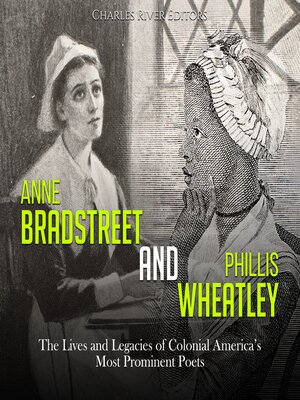Anne Bradstreet and Phillis Wheatley
audiobook (Unabridged) ∣ The Lives and Legacies of Colonial America's Most Prominent Poets
By Charles River Editors

Sign up to save your library
With an OverDrive account, you can save your favorite libraries for at-a-glance information about availability. Find out more about OverDrive accounts.
Find this title in Libby, the library reading app by OverDrive.



Search for a digital library with this title
Title found at these libraries:
| Library Name | Distance |
|---|---|
| Loading... |
Anne Bradstreet was born into an unusual family that, in the early years of the 17th century, believed in educating daughters as well as sons. She then moved to the American wilderness as a young bride and proceeded to produce children and poetry at nearly equal speed in the years that followed. Historian Theodore Stanton observed, "The most of her poems were produced between 1630 and 1642, that is, before she was thirty years old; and during these years she had neither leisure, nor elegant surroundings, nor freedom from anxious thoughts, nor even abounding health. Somehow, during her busy lifetime, she contrived to put upon record compositions numerous enough to fill a royal octavo volume of 400 pages, — compositions which entice and reward our reading of them, two hundred years after she lived."
Phillis Wheatley has always been a difficult figure for people to wrap their minds around, both during her life and centuries after it. Indeed, she fits no easy stereotypes that historians or contemporaries liked to use to classify their subjects. Even her name is complicated, with her first name being spelled at times "Phyllis," and her surname being given without the extra "e" in the final syllable. Like so much of her life, her name was not the one given to her by her parents but instead by the people who first enslaved her.
Then there was the matter of her "career," which has always escaped definition. In the 18th century, enslaved people were not supposed to have been educated, certainly not to the level that Wheatley was, nor were they supposed to have creative abilities beyond those taught to them by their masters. In a time and place where slaves were rarely taught to read, they were obviously not expected to write better poetry than the vast majority of their peers.







